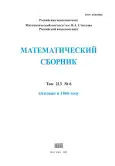Vol 213, No 6 (2022)
- Year: 2022
- Articles: 6
- URL: https://journal-vniispk.ru/0368-8666/issue/view/7490
The $p$-convexity functor for $L_p(X)$-spaces
Abstract
A construction for transforming an arbitrary $L_p(X)$-norm on a normed space $E$ into a $p$-convex norm is put forward. By applying this construction to the projective tensor norm, an explicit formula for the maximal $p$-convex $L_p(X)$-norm on $E$ is obtained. Bibliography: 9 titles.
Matematicheskii Sbornik. 2022;213(6):3-12
 3-12
3-12


 13-20
13-20


Canonical geometrization of orientable $3$-manifolds defined by vector colourings of $3$-polytopes
Abstract
The geometrization conjecture of Thurston (finally proved by Perelman) says that any oriented $3$-manifold can canonically be partitioned into pieces, which have a geometric structure modelled on one of the eight geometries: $S^3$, $\mathbb R^3$, $\mathbb H^3$, $S^2\times\mathbb R$, $\mathbb H^2\times \mathbb R$, the universal cover of $\mathrm{SL}(2,\mathbb{R})$, $\mathrm{Nil}$ and $\mathrm{Sol}$. In a seminal paper (1991) Davis and Januszkiewicz introduced a wide class of $n$-dimensional manifolds, small covers over simple $n$-polytopes. We give a complete answer to the following problem: build an explicit canonical decomposition of any orientable $3$-manifold defined by a vector colouring of a simple $3$-polytope, in particular, of a small cover. The proof is based on an analysis of results in this direction obtained previously by different authors. Bibliography: 44 titles.
Matematicheskii Sbornik. 2022;213(6):21-70
 21-70
21-70


Self-affine $2$-attractors and tiles
Abstract
We study two-digit attractors (2-attractors) in $\mathbb{R}^d$, which are self-affine compact sets defined by two affine contractions with the same linear part. They have widely been studied in the literature under various names (integer self-affine 2-tiles, twindragons, two-digit tiles, 2-reptiles and so on) due to many applications in approximation theory, in the construction of multivariate Haar systems and other wavelet bases, in discrete geometry and in number theory. We obtain a complete classification of isotropic 2-attractors in $\mathbb{R}^d$ and show that all of them are pairwise homeomorphic but not diffeomorphic. In the general, nonisotropic, case weprove that a 2-attractor is uniquely defined by the spectrum of the dilation matrix up to affine similarity. We estimate the number of different 2-attractors in $\mathbb{R}^d$ by analysing integer unitary expanding polynomials with free coefficient $\pm2$. The total number of such polynomials is estimated using the Mahler measure. We present several infinite series of such polynomials. For some 2-attractors their Hölder exponents are found. Some of our results are extended to attractors with an arbitrary number of digits.Bibliography: 63 titles.
Matematicheskii Sbornik. 2022;213(6):71-110
 71-110
71-110


On metric properties of $C$-capacities associated with solutions of second-order strongly elliptic equations in $\pmb{\mathbb R}^2$
Abstract
For certain capacities that were used previously to formulate criteria for the uniform approximability of functions by solutions of strongly elliptic equations of the second order on compact subsets of $\mathbb R^2$, a number of metric properties are established. New, more natural criteria for individual approximability are obtained as consequences. Unsolved problems of interest are stated. Bibliography: 13 titles.
Matematicheskii Sbornik. 2022;213(6):111-124
 111-124
111-124


Hardy-Littlewood-Sobolev inequality for $p=1$
Abstract
Let $\mathcal{W}$ be a closed dilation and translation invariant subspace of the space of $\mathbb{R}^\ell$-valued Schwartz distributions in $d$ variables. We show that if the space $\mathcal{W}$ does not contain distributions of the type $a\otimes \delta_0$, $\delta_0$ being the Dirac delta, then the inequality $\|\operatorname{I}_\alpha [f]\|_{L_{d/(d-\alpha),1}}\lesssim \|f\|_{L_1}$ holds true for functions $f\in\mathcal{W}\cap L_1$ with a uniform constant; here $\operatorname{I}_\alpha$ is the Riesz potential of order $\alpha$ and $L_{p,1}$ is the Lorentz space. As particular cases, this result implies the inequality $\|\nabla^{m-1} f\|_{L_{d/(d-1),1}} \lesssim \|A f\|_{L_1}$, where $A$ is a cancelling elliptic differential operator of order $m$, and the inequality $\|\operatorname{I}_\alpha f\|_{L_{d/(d-\alpha),1}} \lesssim \|f\|_{L_1}$, where $f$ is a divergence free vector field. Bibliography: 59 titles.
Matematicheskii Sbornik. 2022;213(6):125-174
 125-174
125-174











